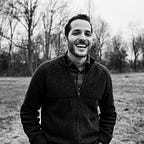Curating and Dog Training
Auri has been patiently teaching me a lot since I got her almost 5 months ago. An adorable, sweet, 1.5 year old Australian Shepherd Mix, she doesn’t have a bad bone in her body, and she has been an essential constant to me in what has otherwise been a time of constant change. Unfortunately, I haven’t been a great listener, but to her credit she hasn’t stopped trying.
When training a dog, this, more or less, is all there is to it:
Lets say you as the dog trainer want to teach your dog a behavior called behavior “Y”. All you have to do is reinforce behavior “Y” when your dog does it, whether through treats, praise, attention, etc. The more you do this, the more likely the dog is to do behavior “Y” in the same situation in the future. If you ignore a behavior, lets call this behavior “X”, the dog will see that nothing special happens when they do “X”, and so they will stop doing it in favor of behavior “Y”. This basic principle can be found in many dog training videos, and in just about any article on how best to train your dog through positive reinforcement. They all say pretty much the same thing: reward the behavior that you want, and ignore the behavior that you don’t. This is all simple enough, except that I am not a professional dog trainer, and so my personal tendencies in life carried over to my tendencies in dog training.
What had thrown me off for so long was this idea of “ignoring” the undesirable behavior. It just feels so juvenile doesn’t it? Reminiscent of middle school when you would plug your ears and yell “LALALALA” at the top of your lungs when you are being told something you don’t want to hear.
“Ignoring” the behavior is paradoxical. How can I ignore it if I am supposed to know it’s there and watch for it? You ignore something you don’t like. You ignore something that frustrates you. Ignoring is passive-aggressive. Whether it should have or not this idea really tripped me up. This weekend, while continuing to reinforce the behaviors that I did want, I, instead of ignoring undesirable behaviors, started to just make space for them. Instead of wishing the behavior away, a part of me opened up and I became content that my pup was doing exactly what she was doing.
Through the practice of making space I also began to let go. You can’t make space for something and hold on tight to your previous ideas; you run out of room. So, out of necessity, I let go of the expectations I had for my dog. I let go of how quickly I wanted her to pick up a new trick, I let go of my frustration when she didn’t get it despite trying over and over and over. I realized how much of my own personal frustrations were being channeled into my work with this wonderful animal. Long days of work, the desire to be able to leave her alone for a few hours at a time without worrying so I could go out with friends, my own personal struggles with the uncertainties of my future. All along, Auri has been patiently waiting for me to drop my ideas for her and to just embrace her just as she is. Five months in, I finally started to listen.
But Auri isn’t just teaching me how to be a better dog trainer. She is teaching me how to live a better life. Making space for the things we don’t like or want — working long hours, being lazy, eating poorly, taxes, your car breaking down — without wrestling with them. They’re not “not supposed to happen”. They just happen, and when they do all we need to do is make space. Good things come along as well of course; we feel fulfilled in our work, proud of a good workout, enjoy a delicious, nourishing meal, experience connection and motivation. These are the moments we validate, reflect on, and reinforce. If we do this, maybe, just maybe, over time we become the curators of our own experience. Slowly, day-by-day, the highs become higher, and the lows not-so-low. Maybe in this way, bit by bit, our experience changes. Likely not based on the time line we want, or in the way we wanted it to, but for the better all the same.
